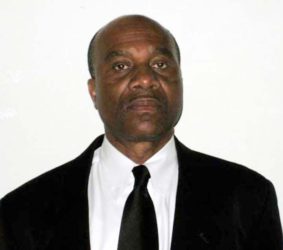The State Assets Recovery Bill which is due to be debated in the National Assembly today is the best version and one that makes sense, Chief Executive Officer of the State Assets Recovery Unit (SARU), Major (rtd) Aubrey Heath-Retemyer said on Tuesday, adding that some of its critics benefited from the theft of national wealth under the previous administration.
“No matter what you put in that Bill they aren’t going to go for it…. We offered clarifications and we maintain that for the Bill to have any teeth we had to make it as tight as possible,” Heath-Retemyer told Stabroek News.
He said there were people who really want the Bill and had concerns. He informed that the crafters of the proposed piece of legislation met with these persons at sessions held in January last year and then later in the year. “People generally asked questions and we made those modifications and we offered clarifications,” he said, before adding that there are some people who just don’t want the Bill. He made reference to individuals who bought government buildings. Some of these persons, he said, are “fiercest critics of this Bill. They have the most opposition [to it].”

Heath-Retemyer rejected the criticisms from the Private Sector Commission (PSC), the opposition and the Guyana Human Rights Association (GHRA), saying that he has been left disappointed.
The PSC has written several press releases on the matter and last month wrote to Speaker of the National Assembly Dr Barton Scotland asking that the Bill be taken to a parliamentary select committee for further deliberation before passage. Two days later, the commission called for the Bill to be recalled
“I am disappointed and disgusted because these people show a degree of partiality that could not be countenanced. It’s nonsense. Some of those same people are beneficiaries of the theft of national property that took place under the previous administration. You check out the owners of some of those properties in Liliendaal…,” he said.
The PSC’s arguments are that the Bill is deeply flawed.
The GHRA, among other things, warned that without political consensus, the draft Bill ran the risk of “prolonging ethnically polarised politics.” Heath-Retemyer said he could not understand where the GHRA was when hundreds of young men lost their lives with no steadfast commitment to pursue justice. “So human rights wouldn’t have respect until they are serious about dealing with issues which have hurt and caused tears of parents and wives and children…,” he said.
With regard to the comments made by the opposition PPP/C. he said they were far from being constructive.
Asked if he is confident that the best possible Bill is now before the House, Heath-Retemyer responded, “Yes. We believe it is the best version. We are mindful that you can create a situation where things are so draconian – what happens if the government changes…we are talking about a Bill which makes sense.”
He expressed belief that there needs to be a Bill that can give the legal authority to do what needs to be done. He denied that there will be witch-hunting and that certain people will be targeted. “I consider it sheer rubbish that you get out of the opposition leader. He is never constructive,” he stressed.
Chartered accountant and attorney Christopher Ram and the Central Corentyne Chamber of Commerce have made their positions on the Bill public, with the latter also calling for it to be sent to a select committee of Parliament.
Ram, in an analysis of the Bill which was published in Stabroek News, concluded that some aspects were excessive, faulty and dangerous.
“Regardless of the intentions and motives behind this Bill, it has all the ingredients for the making of a police state.
It should be referred to a Select Committee with access to the best possible legal inputs from persons versed in a range of laws,” he wrote.
Ram stated that the model of the Bill was “an extreme form of asset forfeiture wherein presumption of innocence may no longer apply,” while noting that such a presumption was a bedrock principle and underpins the rule of law.
Minister of State Joseph Harmon had said that all the concerns raised during wide-reaching consultations on the proposed law were taken into consideration before it was tabled in the National Assembly.
“Clearly the recommendations that have been made by the private sector, those recommendations were taken into consideration and so now for them to say that it should go to Select Committee… When a matter goes to Select Committee it is really giving the public and other organisations another opportunity to comment on it and we have given them that opportunity,” Harmon said during a post-Cabinet press briefing two weeks ago. He also said that government will go ahead with a parliamentary debate on the proposed law today.
Harmon indicated that if at the end of the process there were issues arising that propel government to “go in a certain direction, whether it goes to select committee or whether we pass it as it is then that’s a decision that will be made then.”
According to its Explanatory Memorandum, the Bill is intended to give effect to the non-conviction-based asset recovery recommendations contained in the United Nations Convention against Corruption 2003, which was ratified by the Government of Guyana in April 2008. “The Bill therefore introduces legislation to combat unlawful conduct and corrupt practices in relation to property and other assets owned by the State, or in which the State has an interest,” it said.
It added that the Bill provides for the establishment of the State Assets Recovery Agency (SARA), which has as its primary function the civil recovery of state property obtained through the unlawful conduct of a public official or other person, or any benefit obtained in connection with that unlawful conduct, by way of civil proceedings taken in the High Court for a civil recovery order.




